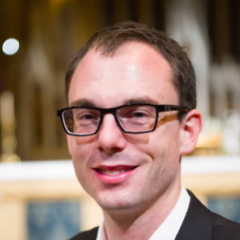Tonight's Prom gave the chief conductor of the BBC Symphony Orchestra, Jiří Bělohlávek, the chance to showcase two masterpieces from his homeland, with the first half comprising the ever-popular Cello Concerto No. 2 by Dvořák and the second half, Smetana's epic cycle of symphonic poems, Má Vlast. The latter work, surprisingly, received its first complete Proms' performance this evening.
As the excellent program notes informed us, Dvořák wrote his Cello Concerto when they were rather out of fashion. He himself was still wary of what he termed as 'the nasal quality of the high notes and the mumbling of the bass'. The test of time has well and truly shown that Dvořák need not have worried. The Concerto certainly brings out every expressive and virtuosic quality of the instrument, no more so than was demonstrated by tonight's soloist, Jean-Guihen Queyras. He clearly exhibited his enviable technique, producing flawless intonation and wonderful expressivity. Particularly impressive was his double-stopping (playing more than one note at a time) particularly in the faster sections, while in the more serene, lyrical sections Queyras produced a beautifully sweet tone almost akin to the human voice.
Sadly, the orchestra did not really respond to the impassioned efforts of the soloist. While they provided a perfectly satisfactory accompaniment, there was nothing to really excite the listener. I found myself yearning for the conductor to inject some patriotic passion to inspire his players. If he did, they did not really react. Perhaps they were saving themselves for the second half and Smetana’s great symphonic poems? However, after the Concerto had finished, our minds were diverted from thoughts of forthcoming nostalgic Bohemia homecomings as we were treated to an exquisite encore from Queyras, the Sarabande from J.S. Bach’s Cello Suite No. 2. This was one of those wonderful moments when one becomes very aware of every sound in the Albert Hall as thousands of pairs of ears are captivated by the simple beauty of the solo Cello and minds are transported.
Maybe the Bach encore transported the orchestra as well as the audience, as the orchestra that returned after the interval felt completely different to the one that had left the stage twenty minutes earlier. Every section of the orchestra suddenly became more impassioned and more animated. Jiří Bělohlávek seemed to have more of a swagger about himself too as he drew every possible nuance out of Smetana’s score, with the orchestra promptly responding, the players clearly enjoying themselves. There was impressive playing from every section of the orchestra. Particularly enjoyable was the first movement, which showcases four harpists. There are few occasions in symphonic music with such rich and sonorous harp writing as this. This first Symphonic Poem is essentially about a castle towering over the Bohemian landscape. The harps certainly helped to convey this pervading sense of grandeur, as did the brass section of the BBC SO, who produced a very satisfyingly full and round sound. This contrasted with the more dramatic, angry, biting brass sound need for the third movement, which was also carried off with aplomb.
Probably the highlight of the evening for me was the best-known movement of the cycle, Vltava, which essentially depicts a river flowing through the countryside. Particularly impressive in this movement was the virtuosic woodwind playing, especially from the flutes at the movement’s outset; this was beautifully and delicately played. Bělohlávek brought a wonderful freshness to this well-known movement, the wonderfully weaving melody was sensitively crafted and phrased and flowed as seamlessly as the river it was depicting.
The final two movements of the work, which run together without a break, concern themselves with the wars fought in the early fifteenth century and (as the program notes stated), ‘the painful conflict between Bohemian Protestantism on the one hand and the Catholic Church and the Holy Roman Empire on the other’. To a certain extent it sums up the theme running through the cycle, the search for Czech national identity and above all nationalism. The chorale theme on which much of the two movements are based is often painfully fragmented and the broken parts of the jigsaw are thrown around the orchestra. The different sections of the BBC SO effectively produced this tension. The string section were perhaps at their finest in the last movement with some wonderfully gritty, virtuosic playing. The different instruments of the woodwind section played off each other with seamless interaction until eventually the work came to its reaffirming conclusion with a reprise from the first movement, sending the Albert Hall into raptures.
Any nostalgia for his homeland which Bělohlávek would have felt in conducting the Smetana would surely have been quickly banished by the warmth of the reception he received as he was enveloped by the very British cheers of the enthusiastic prommers.


